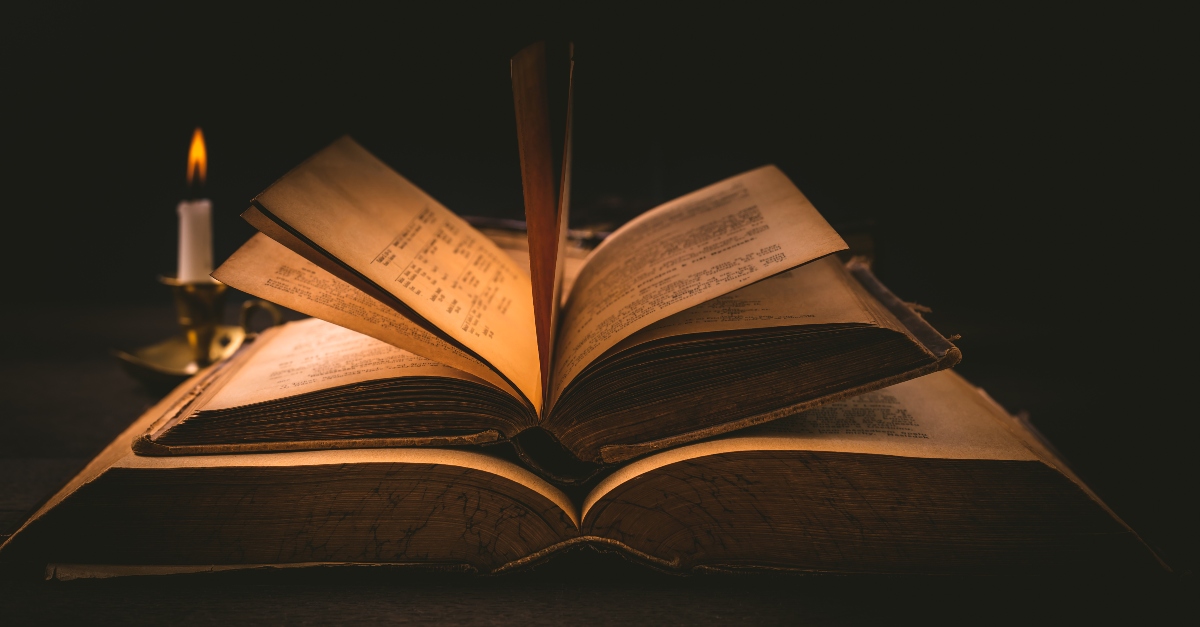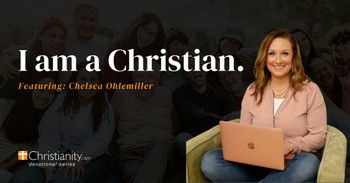Say, “Christian books for women,” and some people will immediately think of historical romance or homeschooling guides. While Christian books written by and for women have often focused on inspiring material, there is so much diversity and depth that many readers miss. The following looks at some great female Christian authors you may know or may not have heard of.
Table of Contents
- 5 Classic Female Christian Authors
- 5 Modern Female Christian Authors Who Write Nonfiction
- 5 Modern Female Christian Authors Who Write Fiction
- Articles about Female Christian Authors

5 Classic Female Christian Authors
These authors may appear in the classics section of Christian bookstores, but their names may not be familiar to you. Some of them were prolific. Others wrote a few pieces that had a larger impact than they expected. Each has something worth discovering (or rediscovering).
1. Maria von Wedemeyer
The chances are, unless you’re a fan of German WWII history, you’ve never heard of Maria von Wedemeyer. She plays an important but understated role in the life of one of the twentieth century’s most famous Christian martyrs. In 1943, she became engaged to a family friend, theologian Dietrich Bonhoeffer. He had been barred from preaching in Germany for speaking against Hitler and was involved in several resistance activities. One of these activities led to Dietrich’s arrest three months after their engagement, and he spent the rest of World War II in prison. Maria continued supporting him during this time, and the couple shared many letters. Dietrich was executed less than a month before Germany surrendered for his connection to a Hitler assassination plot. Maria later moved to the United States and became a computer scientist. She published several of their letters in an article about their relationship in 1967. After Maria’s death, her sister Ruth-Alice von Bismark published all the couple’s letters in Letters from Cell 92. It provides a powerful look at a short-lived but inspiring story (also depicted in Amanda Barrett’s novel My Dearest Dietrich).
2. Dorothy L. Sayers
A lay theologian, playwright, translator, and mystery author, Dorothy L. Sayers seemed to write just about everything. While she wasn’t technically a member of the Inklings, scholars like Gina Dalfonzo have shown how her friendship with C.S. Lewis (and, to a lesser extent, Charles Williams) informed her work. Like the Inklings, she was committed to living the Christian life well, using her mind and other talents for God as best as she could. The result was a variety of books in different genres (The Mind of the Maker, The Man Born to Be King, The Nine Tailors) that can be read and re-read for new insights.
3. Elisabeth Elliott
Most Christians know Elisabeth Elliott as the woman who stayed to do missionary work in an indigenous tribe that killed her husband. Many don’t know that Elliott’s famous book about her ministry, Through Gates of Splender, is just one of many books she wrote. Over 50 years (her last book, Suffering is Never For Nothing, appeared posthumously in 2019), she addressed many subjects. Her books include nonfiction works about Christian identity (Let Me Be a Woman), a biography (A Chance to Die: The Life and Legacy of Amy Carmichael), and even a novel (No Graven Image).
4. L.M. Montgomery
Most readers today know L.M. Montgomery as the author of Anne of Green Gables and many other children’s books. As scholars like Brenton Dickieson have observed, Montgomery was also a “Presbyterian minister’s wife, and church leader, and her 21 novels and 500 short stories include conversations about faith and are deeply attentive to spirituality and social morals.” Readers can see Montgomery’s spiritual ideas in her various children’s book series (like the Anne of Green Gables series and the Emily trilogy), her short stories (collected in books like Twice Upon a Time), poems (many collected in A World of Songs), and her memoir (The Alpine Path).
5. Edith Schaeffer
While her husband, apologist Francis Schaeffer, is better known, Edith Schaeffer was his collaborator who helped make the L’Abri center in Switzerland possible. She was also a gifted writer who worked in a variety of genres. Her works include the definitive history of L’Abri, memoirs about her life (Mei Fuh: Memories from China), and Christian living books about underrated skills (The Hidden Art of Homemaking, Forever Music: A Tribute to the Gift of Creativity).

5 Modern Female Christian Authors Who Write Nonfiction
Christian nonfiction is a broad term that can cover anything from spiritual development to academic studies. These authors each have a particular focus and represent some of the best work in their particular area.
1. Jennifer Woodruff Tait
The editor of Christian History magazine, Jennifer Woodruff Tait has written about everything from Christian education to the Inklings to what happened when Methodists switched to non-fermented communion grape juice. Her best book so far may be Christian History in Seven Sentences, which looks at seven key Christian church documents (from the Edit of Milan to the Second Vatican Council) that changed Christianity in crucial ways. Each of her works explains history clearly, but without boiling everything down to all-too-simple formulas.
2. Lisa Whittle
A pastor’s kid who went on to write Christian books, Whittle writes about the Bible and the Christian life from an inspiring yet honest perspective. Some of her books help readers cultivate better spiritual habits (5-Word Prayers). Some dive a little deeper, helping readers consider the hard question of what to do when “the good Christian life” doesn’t go as planned (Jesus Over Everything, The Hard Good, I Want God). Each combines great storytelling, practical insights, and relatable humor.
3. Linda Chaffee Taylor
Linda Chaffee Taylor brings two interesting perspectives to her work. As a writer, she’s contributed to many Bible study and Christian living books (including The Life Application Study Bible and Saints and Scoundrels of the Bible), providing a clear writing tone and relatable insights. She is also an editor with years of experience crafting words and dealing with unusual problems that Christian writers face (“how much of the Bible can we quote?”). This second perspective informs her book Word by Word, a great guide for Christian authors learning to edit their work and work with an editing team.
4. Esther Maria Magnis
Esther Maria Magnis is a European journalist who has written several books about religion. Her most famous book, now available in English as With Or Without Me, looks at her surprising spiritual journey after losing a parent to cancer. Magnis details the heartbreak of losing a parent, of prayers not being answered as expected, and years of figuring out what one lives for after rejecting God… only to come back unexpectedly. She doesn’t pull any punches in her descriptions of anger and grief, and equally criticizes secular people who gave flippant answers and religious people who gave cheap sympathy. Ultimately, her description of finding God again helps readers consider the messy question, “what is life for, if not for following God?” without clichés.
5. Jessica Hooten Wilson
Jessica Hooten Wilson has taught literature at John Brown University and other schools and is an excellent guide to understanding good books. She has written or edited several academic books (Reading Walker Percy’s Novels, Giving Jesus His Due), showing readers how Christian authors like Aleksandr Solzhenitsyn and Walker Percy provide great lessons that shouldn’t be forgotten. Layman readers can benefit from Wilson’s books about the spiritual value of reading the classics (The Scandal of Holiness, Reading for the Love of God).

5 Modern Female Christian Authors Who Write Fiction
These writers are mostly new names in the field. Some of them write romantic thrillers. Some write fantasy. Each brings something distinct that makes their work more memorable and interesting than their competitors.
1. Amy Lynn Green
Amy Lynn Green has published three novels so far, each historical fiction set in WWII. However, she picks unusual settings that set her work apart, surpassing the genre cliches. In Things We Didn’t Say, a linguist reluctantly returns to her hometown to work at its German POW camp and finds herself forced between several different conflicts. The Lines Between Us follows siblings with opposing ideas about pacifism as they investigate suspicious fires in Oregon. The Blackout Blook Club depicts a group of women trying to keep a Maine library open while figuring out what they can do to help the war effort.
2. Hope Bolinger
Hope Bolinger has a wide range of work, from plays to publishing guides, and currently edits an imprint under publisher End Game Press. Her fiction ranges from suspense to comedy, but even her darkest stories have some humor and a redemptive storyline. The Blaze trilogy reimagines the story of Daniel as a thriller in a contemporary high school setting, where moving into a tightly controlled prep school proves more dangerous than several students realize. The Roseville Romances series, co-authored with Alyssa Roat, tells funny stories about artists (authors, actors, musicians) who aren’t sure how to find income, much less love. The Dear Hero series (also co-written with Roat) provides a different kind of romantic comedy, satirizing superhero tropes as it tells the story of a superhero and supervillain who discover they have much in common.
3. Eleanor Taylor Bland
Detective stories have an interesting Christian heritage, thanks to writers like Sayers, Ronald Knox, and G.K. Chesterton, who informed its golden age. Eleanor Taylor Bland was a modern detective novelist but brought a distinctly Christian approach to her stories that carried on this tradition. Her novels featured probably the first African-American female detective, Marti MacAlister, fighting for justice in a Chicagoland suburb. MacAlister’s faith plays a continued role in the series, but the books don’t shy away from tough religious questions.
4. Alyssa Roat
Alyssa Roat has a similar writing style to her frequent collaborator Hope Bolinger. However, she has her owncular style (a little more suspenseful,
that is clearly comes out in her solo projects. The Wraithwood trilogy is a clever fantasy story about Brynna “Brinnie” Lane, who doesn’t know she has an uncle living in New York. When she has to stay with him for a summer, she discovers that her mother has been hiding more than just her uncle’s existence. The Wraithwood estate has something magic about it… in fact, it has prophecies and ancient threats too.
5. Lynette Eason
Lynette Eason writes romantic suspense thrillers, usually involving either law enforcement (the Extreme Measures series) or military personnel (the Danger Never Sleeps series). Some (like Christmas Homecoming Secrets) contain more romance than others, but each gives well-written characters and well-honed plots. The forensic elements (how police solve crimes, etc.) are built on great research, adding an authenticity that puts her above many similar authors.
Articles about Female Christian Authors
The following articles take a deeper look at some of the female Christian authors mentioned here, as well as ones you may never have heard about.
5 Books for Christian Women Who Don’t Like Books for Christian Women
10 Things You Should Know about Ida B. Wells
What You Need to Know about Dorothy L. Sayers
30 Inspiring Helen Keller Quotes
20 Christian Women Who Shaped History
5 Things to Know and Love About Priscilla Shirer
If you enjoyed this article, you may enjoy the following:
50 Christian Authors You Should Know
10 Inspiring Christian Mystery Authors You Can Read Today
20 Great Books on Christian Music
15 Great Christian Sci-Fi Books for Kids and Adults
50 Great Books on Christian Art
15 Classic Christian Fantasy Books for Kids and Adults
10 Exciting Christian Suspense Authors You Should Read Now
Five Pro-Life Books Every Christian Should Be Reading Now
Photo Credit: ©iStock/Getty Images Plus/fcscafeine




